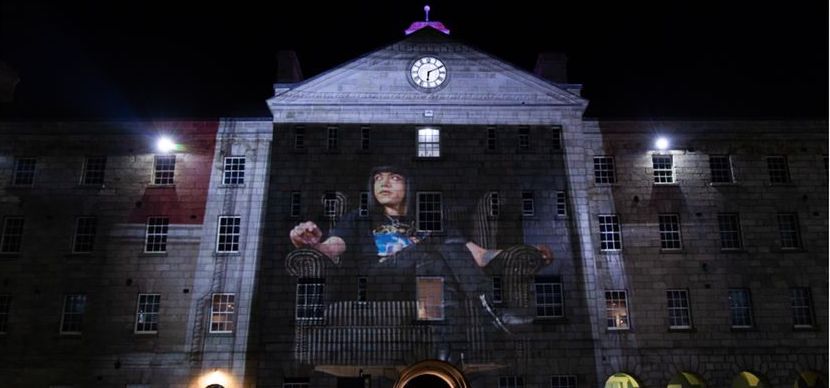On the evening of February 1st, the front gate of Collins Barracks was lit up with powerful images of transgender women and non-binary folk. The EveryWoman Project involves three organisations advocating for issues affecting women, transgender and non-binary people; Herstory, the Transgender Equality Network Ireland (TENI), and The Stairlings Collective.
Jules Farrell and Alexandra Hall, co-founders of The Stairlings Collective, are the creators of the event. The duo founded The Stairlings Collective as an organisation focused on LGBT+ history and arts with Dublin-based artist Alisha Doody. Farrell explained that both of them “wanted to talk to more transgender women”, particularly those who were more established in the community. The EveryWoman Project is a source of pride for Farrell, and a “chance to celebrate transgender people on a big, national screen”. Farrell and Hall were particularly focused on building an accessible community both for them and for younger transgender and non-binary generations.
Hall wanted to create “positive representations” of transgender women rather than of modern media culture which “makes fun of or sexualises transgender people”. Hall notes “having control over our image” enables those outside of the community to “look a bit deeper” and see transgender and non-binary people for “who they really are”.
The chair of the TENI, Sara Phillips, helped Farrell and Hall get the event off the ground, providing the vital connections to the established transgender community they were searching for. Phillips described The EveryWoman Project as an opportunity to put “happy, visible transgender women” into the public domain. Although transgender women experience “voyeuristic representations”, she says, “we have been here for such a long time” and “we are here, we are happy”.
Aoife Martin, the company secretary of TENI commented: “visibility for transgender women is very important.” She went on to say: “When I was growing up, there were no visible transgender people.” Phillips also points out how the EveryWoman Project is “linking the older part of the transgender community with the younger part”. Phillips says it was helpful for her to “feel the wind” at her back provided by youth activists such as The Stairlings. Martin also believes that “the future is with young transgender people”, adding that it is vital for the younger generations to see that transgender people come from “all walks of life” and that “they see their own reflection in these photographs”.
Phillips acknowledges that there are more steps to take with regard to transgender security in Ireland: “There are still transgender people who are afraid to come out, to be visible, to navigate life in a safe way”. Phillips notes that although “we want to participate fully in Irish society”, the LGBT+ community cannot and should not do all the heavy lifting. Nonetheless, she admits that “Ireland has come a long way”, and the projection on Collins Barracks was a powerful national image.
After some preliminary drinks and chats, the attendees of The EveryWoman Project ventured out into the courtyard of Collins Barracks. As the audience watched the show, various representatives from each organisation spoke about the importance of the event, beginning with a speech from Alisha Doody. Doody emphasised the importance of the event catering to LGBT+ youth who are “looking for positive representations, positive role models in their lives”. Doody also highlighted the importance of supporting the transgender community as allies “without speaking for them”.
Keeva Lilith Carroll, the National Community Development Officer of TENI, spoke of the modern struggles of the LGBT+ community today, mentioning stereotypes and prejudices which “hinder access to resources and spaces” for transgender people, particularly in the case of the “abundance of untapped talent” within the transgender community. Carroll explains how most work representing transgender people today is unfortunately “conjured by privileged voices”. Rather than the “examining and documenting” perspective of the cisgendered media, Carroll says it is vital the transgender community “speaks to their own narrative” and provide their “own vision” of their identity. She advised allies of the trans community to remember the mantra, “nothing about us without us”. Carroll urged allies and those outside the community to remember the Repeal the 8th movement. Abortion rights are about bodily autonomy, says Carroll. Similarly, the “transgender community is fighting for bodily autonomy” through healthcare and other issues. Carroll identifies this parallel as a “common cause”.
As the event came to a close, Melanie Lynch, the founder of Herstory, explained her mission — to explore “her-story” with a “special focus on voices we never hear”. The EveryWoman Project was a fantastic display of femininity in its many forms, a powerful image projected upon a national monument, representing the youthful initiative of The Stairlings Collective to simultaneously build community and inspire younger generations.
Hall, Carroll, Farrell, Phillips, and Martin all emphasised how throughout history, and even in modern Ireland, transgender and non-binary folk have been treated as invisible. Phillips notes that it may seem as though transgender women are “everywhere all of the sudden”, however, “we have been here for over one thousand years” and “we have continued to blossom”.
Lynch “wanted to spotlight these voices” and to help guide them “out of the shadows, into the light”, as she recognises the importance of representation. Lynch believes young people are “way ahead of [her] generation” and stresses how “whatever dominates the curriculum dominates culture”. Similar to Aoife Martin’s previous point, Lynch explained that she wasn’t exposed to transgender role models until much later in life, which truly helped her discover her identity.
Through her research Lynch discovered plenty of tribal cultures such as Native American and Canadian tribes who celebrate transgender and gender non-conforming individuals as being able to “see through masculine and feminine”. She believes we are in the “golden age” and a zeitgeist change is occurring as we speak. Lynch finds optimism in the contrast between different generations, mentioning that she didn’t go to her first march until she was in her twenties, whereas her godson “had a fully formed opinion about Trump the day he got into office”.






